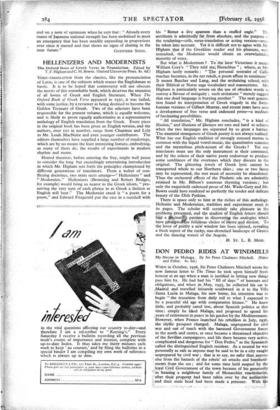HELLENIZERS AND MODERNISTS
The Oxford Book of Greek Verse in Translation. Edited by T. F. Higham and C. M. Bowra. (Oxford University Press. 8s. 6d.)
VERSE-TRANSLATION from the classics, like the pronunciation of Latin, is one of the subjects which rouses the Englishman to battle. It is to be hoped that controversy will not obscure the merits of this remarkable book, which deserves the attention of all lovers of Greek and English literature. When The Oxford Book of Greek Verse appeared in x93o, .it was hailed, with some justice, by a reviewer as being destined to become the Golden Treasury of Greek. Two of the selectors have been responsible for the present volume, which is equally welcome, and is likely to prove equally authoritative as a representative anthology of English translation from the Greek. Every piece in the original book has been given an English version, and the authors, over 120 in number, range from Chapman and Lyly to Mr. Louis MacNeice and even younger contributors. The editors themselves have supplied a large number of renderings, which are by no means the least interesting feature, embodying, as many of them do, the results of experiments in modern rhythm and metre.
Heated theorists, before entering the fray, might well pause to consider the long but exceedingly entertaining introduction in which Mr. Higham sets forth the principles championed by different generations of translators. From a welter of con- flicting doctrines, two main sects emerge—" Hellenizers " and "Modernists." Hellenizers (Browning and Robert Bridges, for example) would bring us nearer to the Greek idiom, " pre- serving the very turn of each phrase in as Greek a fashion as English will bear." The Modernist creed is "a poem for a poem," and Edward Fitzgerald put the case in a nutshell with his "Better a live apanwava. than a stuffed eagle." TL antithesis is admittedly far...from absolute, and the purpose c. the rendering—crib, verse-iiinslation or acting version—must
be taken into account. Yet it is difficult not to agree with Mi. }Ugh= that if the Greeldess reader and his pleasure, were consulted, the Modernist would obtain an overwhelming majority of votes.
But what is Modernism ? Tcrthe 'later Victorians it meant William Cory's "They told me; Heraclitus " ; where, as Mr.
Higham justly remarks : "The personal restraint of Call- machus becomes, in the net result, a poem effuse in sentiment." It meant Butcher and Lang, and the archaising school, with their Biblical or Norse saga Vocabulary and mannerisms. Mr.
Higham is particularly severe on the -use of obsolete words to Convey a flavour of antiquity ; such archaisms "merely suggest that one dead language is burying another." The next genera- tion found its interpretation of Greek tragedy in the Swin- burnian versions of Gilbert Murray, and recent years have seen a development of free verse and cadenced prose—a medium of fascinating possibilities.
"All translation," Mr. Higham concludes, " is a kind of Illusion," and illusions of likeness are rare and hard to achieve
when the two languages are separated by so great a barrier.
The essential strangeness of Greek poetry is not always realised. What has our English tradition of strongly stressed metres in common with the liquid vowel-music, the quantitative scansion and the mysterious pitch-accent of the Greeks ? Yet our translators must use the only instrument at their command, and by the echoes of their native poets endeavour to produce
some semblance of the overtones which they discern in- the original. The glittering jewels of Greek lyric cannot be
transported whole to our Northern skies ; one or two facets may be represented, the rest must of necessity be abandoned. Thus the orchestral effects of the Pindaric ode are admirably retained in Mr. Batson's sonorous rhyming versions;. but only the exquisitely cadenced prose of Mr. Wade-Gery and Mr. Bowra could have rendered so perfectly the tender and delicate beauty of the IXth Pythian.
There is space only to hint at the riches of this anthology. Hellenist and Modernizer, tradition and experiment meet in
its pages. The scholar will certainly take pleasure in the problems presented, and the student of English letters should fuid a ,kcina s pasthne in discover 4 the analogies which
have R .
pte e felfoitous choice of 4tre-And diction. To the lover of pdeiry a new' window has been opened, revealing a fresh aspect of the rocky5. sun-drenched larwlscape of Greece and the dancing waiera of the Aegean.
H. Si. L.. B. Moss.










































 Previous page
Previous page